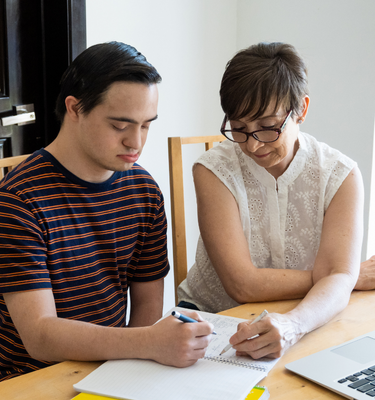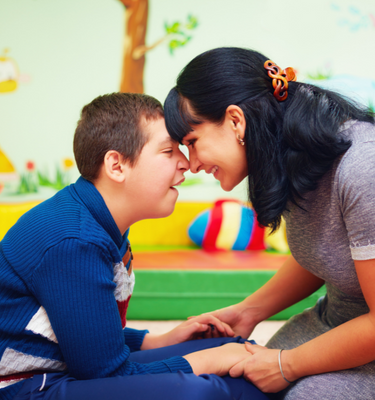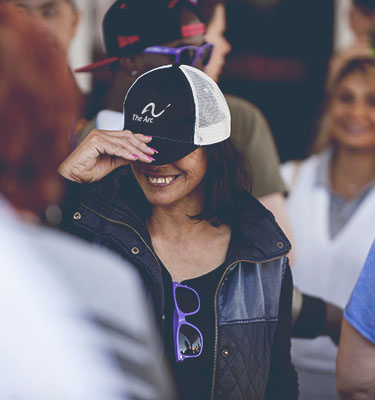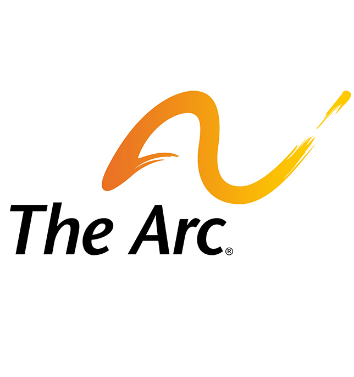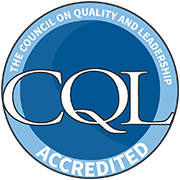Celebrating National Caregiver Month With The Arc Wisconsin
 Each November, we observe National Caregiver Month – honoring those who devote their lives to providing care for individuals with intellectual and developmental disabilities.
Each November, we observe National Caregiver Month – honoring those who devote their lives to providing care for individuals with intellectual and developmental disabilities.
The daily demands of caregiving for individuals with I/DD and elderly adults can be challenging, and the commitment of time and resources that goes into ensuring a loved one’s well-being leaves little time for personal goals, professional duties and planning for the future.
At The Arc Wisconsin, Lisa Pugh is working hard to take a leadership role in the fight to support caregivers throughout the state.
One of the largest groups that make up the caregiving population are family members and loved ones. What is future planning and why is it important?
Future planning is creating a guide for a person with I/DD to lead a good life as independently as possible. A plan is important throughout all stages of life, especially during transitions, and especially in the future after the parent or caregiver is no longer able to provide support.
About 2/3 of the more than 50,000 people with I/DD in Wisconsin live with their families, and there are 16,500 vacant paid caregiver positions. In many of these families, the main caregivers are over age 60. When it comes to thinking about the future, Wisconsin families are like everyone else across the country- they don’t have a plan in place, even though they know they should.
Without a plan in place, those families can easily go into crisis. Many families feel overwhelmed, aren’t even aware of future planning options and resources, and need support to navigate the process.
Many families think future planning is mostly about finances – but good future planning is about so much more. It is about daily routines and future plans about where to live and work. It’s about growing people’s independence in their own decision-making. It really is a holistic look at someone’s life and how to secure and plan for their success and happiness.
What are you doing to meet this need?
We are working hard to expand access to future planning information. Trained planners help Wisconsin families work through common and difficult barriers. Since January 2018 we have trained 25 professionals who have supported more than 123 caregivers and families to begin development of a future plan. The Arc Wisconsin’s network of trained planners reached over 33 towns and cities.
We are also conducting outreach to identify systems barriers, advancing recommendations from a recent respite summit, and offering future planning workshops across the state.
You can learn more about our future planning efforts by watching this short video.
You were recently appointed co-chair of the Wisconsin Family and Caregiver Support Alliance. How can other chapters and organizations utilize coalition cooperation to better serve caregivers?
Caregiving as an issue that many populations are struggling with and many people are affected by. In our state, The Arc Wisconsin has chosen to work alongside aging and dementia advocacy groups to find solutions to support families. Our Alliance is tackling challenges in workgroups to address commonalities like lack of respite care, the need for caregiver support, complicated systems navigation, cultural competence and the need for employers to better support their caregiver employees. We are having success on all of these fronts by working together. In 2019, we plan to publish results of several surveys that we hope will lead to policy changes and perhaps redirected or new funding.
We will kick off this year’s Family Caregiver Month celebration with an Alliance press conference in the Governor’s Conference Room of our state capitol with storytelling by caregivers and presentation of a Governor’s proclamation.
What advice do you have for other chapters looking to expand their efforts in supporting caregivers?
Getting out and talking directly to caregivers has brought credibility to our efforts. Over the last year, The Arc Wisconsin has presented on future planning to groups of caregivers and professionals at Aging and Disability Resource Centers and at other events and conferences throughout the state. We have put on webinars, provided in-service training, and are widely distributing The Arc’s excellent future planning resources. Often communities are just starting to become aware of the fragile situations where elderly moms and dads have an adult son or daughter with I/DD living at home while they continue providing most or all of the care. Future planning is essential in these situations and chapters of The Arc are poised to lead the way in tackling it.
My evolving relationship with my sister with Angelman syndrome
By Amberley Romo
It’s now been almost five years since I first wrote about future planning. I was 22, and living in Washington, DC — 1,300 miles away from my family in Dallas.
At the time, my sister Caroline was 18. We were both entering new phases of our lives. I was fresh out of college, and she had just reached legal adulthood. (Her birthday milestones honestly were always more striking to me than my own). Caroline was born with a rare neuro-genetic disorder called Angelman syndrome. The prevalence of AS is estimated to be somewhere between 1/12,000 and 1/24,000.
I was in third grade when we finally discovered my sister’s diagnosis. I know, because my mom tells the story of how I went to school, and told my third grade teacher that I was worried about how I would take care of Caroline when something happened to our parents.
Years later, when my parents took our family out to dinner to celebrate my high school graduation, I have a perfect memory of sitting at the table feeling deeply guilty, and near tears. I was soon to move to DC for college. At the table, my parents expressed how important they thought it was that I go. When I later moved away to college, it was deeply unsettling for about a semester. Everything I had to do every day suddenly only revolved around, well, me.
The years passed, and I thrived in DC. I love that city. It’s my home away from home. But I felt those tugs. Sometimes the feeling was quiet, sometimes it was loud; but it was there. Feeling too far away, feeling too selfish. Feeling the desire to be a present fixture in the lives of my family members — to be a more active part of Caroline’s care network.
I’m now almost 28; she is almost 24. I lived in DC for eight years. Two years ago, I moved back to Texas. For one of those years, I lived in Dallas. It’s hard to explain the internal battle between feelings of obligation and not knowing with any certainty what you really want, personally. But you know what I’m talking about. It’s part of the human experience. It has nothing specifically to do with having a sibling with disabilities. It’s a universal experience. This is just a particularly salient part of how I experience this struggle. None of us can know if we’re making the right choices; We just do what we can, and keep moving forward.
What I can say with certainty is that living in closer proximity to my sister deepened our connection considerably. When living further away, I could still say hi to her on the phone. (Or like when she somehow figured out how to FaceTime with me while I was at work and she was in class).

But living back home, she would spend the night over at my apartment. We’d make dinner, and watch The Great British Baking Show. She loves to watch my pet rabbits run around. I got back in sync with her nonverbal cues, and she got back in sync with my micro-movements. (I swear to you she can tell when you’ve had a thought, and haven’t even said anything yet — her emotional intelligence is through the roof). It’s these subtleties that were difficult — near impossible, even — to maintain, in a long-distance relationship with her.

There’s no right decision for me, or for other siblings. But I can say for certain that I don’t regret moving back to be closer.
I was reflecting on these past ten years just recently; I was doing some work in a coffee shop, and a family came in. A mom, dad, older sister and younger brother. The younger brother had Down syndrome. They were all hanging his art on the coffee shop wall. As I understand it, the sister had independently reached out to the coffee shop about featuring her brother’s work, and the other artist currently featured on the wall had volunteered to share space. As I chatted with them, and watched as they arranged his art, I had an odd sense of deja vu. Reflecting on being the sister’s age, and pondering college. (She appeared to perhaps be in high school). These thoughts can feel so isolating, but they are such a deeply shared experience. Meeting them by happenstance reminded me of that.
Growing up feels like continuously uncovering that behind the tapestry is a mess of loose ends. From chaos, comes order (or at least hindsight). When I was younger, I worried about Caroline’s future with a general sense of anxiety. Now that I’m older, I worry about increasingly complicated specifics. We have been having active planning conversations for years, and on some level, it grinds away in the back of my brain nonstop. Despite working so proactively, we still don’t feel close to having an answer, or feeling prepared.
I hope that for anyone reading this, these thoughts inspire thoughtfulness, not paralysis. I accept that we can’t ever know anything for certain. It can be overwhelming, but I fervently hope that other siblings and families don’t shy away from these conversations.
Amberley Romo is a software developer in Austin, Texas. She is part of a project to build a free, open-source, web-based communication app.
The Arc Wants to Hear About Your Experience Applying for Jobs Online
If you are an individual with intellectual and/or developmental disabilities (I/DD) (or someone who provides assistance to an individual with I/DD), The Arc wants to hear about your experience applying for jobs online!
Over 85% of individuals with I/DD are unemployed and rely solely on family and/or government supports to get by. The lack of employment options for people with I/DD reduces opportunities for them to interact with their peers in an integrated setting and reinforces the harmful stereotype that people with I/DD are not productive members of their communities. The Arc works in a myriad of ways to improve the employment outcomes for individuals with I/DD to ensure they are able to lead independent, meaningful lives in the community in competitively paid jobs.
As businesses increasingly shift to online platforms, a major concern within the disability community over the last decade has been the accessibility of websites for individuals with disabilities. In an age where more than half of new hires are sourced from the web, it is vital to ensure that individuals with I/DD are able to utilize all of the available tools to gain meaningful community-based employment and stay out of poverty. Great strides have been made in recent years towards improving the accessibility of various websites for individuals with visual and hearing disabilities through methods such as closed-captioning and compatibility with screen-reading software. In allowing individuals to fully experience the web, such tools are as fundamental as ramps for wheelchair users.
Unfortunately, very little progress has been made on this front for those with I/DD. The Arc seeks to ensure that individuals with I/DD do not get left behind and become a web underclass. Like everyone else, individuals with I/DD desire to learn, socialize, and shop online as well as access job opportunities in this forum. Towards this goal, The Arc wants to find out about YOUR experience with applying for jobs online to assess how accessible (or inaccessible) these mechanisms are for you. We have developed two surveys – one intended for individuals with I/DD and the other for those who assist individuals with I/DD such as job coaches or family members – to find out more about your experiences applying for jobs online.
Our community’s ability to access these applications is vital to The Arc’s continued efforts to expand integrated, competitive, and community-based employment opportunities for individuals with I/DD and ensure that the integration mandates of state and federal disability rights laws are meaningfully fulfilled.
New Pathways to Justice™ Video Aims to Help People With I/DD Navigate Daunting System
“Too many times people with disabilities come into contact with the criminal justice system and the outcome is anything but just.”
The opening words of a new video created by The Arc’s National Center on Criminal Justice and Disability (NCCJD), the Pathways to Justice Introduction Video, powerfully highlight the broad lack of justice for people with disabilities within America’s criminal justice system. This four and a half minute video introduces the Pathways to Justice Model, and integral part of the Pathways to Justice training program being piloted by five chapters of The Arc. The Pathways to Justice Training Curriculum helps build the capacity of the criminal justice system to effectively identify, serve, and protect people with intellectual and developmental disabilities (I/DD), many of whom have “mild” disabilities that often go unnoticed among criminal justice professionals without appropriate training. The video points out why communities should seek additional training for criminal justice professionals.
Navigating the criminal justice system, as a suspect, offender, witness, or victim, is daunting for anyone. For people with I/DD and their families, there can be insurmountable obstacles to obtaining justice. The new Pathways to Justice Introduction Video highlights specific cracks in the criminal justice system through the telling of real life stories by people with disabilities and by their family members.
Take James’ story. James Meadours is a powerful self-advocate with intellectual disabilities who experienced multiple victimizations throughout his life—without anyone every knowing. As an adult, James was raped in his own apartment. He found the courage to reach out for help, leading to the successful prosecution of his attacker and the revelation that there had been multiple victimizations throughout James’ life. While this story ended positively with the attacker held accountable for the crime and James empowering others with his self-advocacy, society overall must do a better job creating safer lives in the community for people with disabilities. Research supports the fact that multiple victimizations are quite common among people with disabilities—this is unacceptable. James did not have to suffer in silence alone for so many years, we as a society can do better.
Using the Pathways to Justice Model, NCCJD aims to build collaborative relationships within the criminal justice and disability professions, creating solutions to identify, prevent, and stop injustices faced by people with disabilities. The Pathways to Justice Introduction Video debuted at The Arc’s National Convention in New Orleans with positive reviews, and was played at The Arc of North Carolina’s State Convention the following week. Chapters have already begun requesting copies to take to local law enforcement and criminal justice professionals as a way to effectively demonstrate the need for quality training on disability issues.
NCCJD wants you to help bridge gaps in your community’s criminal justice system. If we’re truly going to stop injustice in our nation’s criminal justice system against people with disabilities, we must take action. Get involved by:
- Sharing the video: Use the conversation guide and the Pathways to Justice Model to begin a collaborative effort in your community. Let others in your state or community know about NCCJD as a reliable and trusted resource funded by the U.S. Department of Justice, and use the video to educate the criminal justice community about the need for effective training on disability issues.
- Using NCCJD as a resource: NCCJD provides technical assistance and information & referral regarding a broad range of criminal justice issues.
- Putting your state’s resources on the map: If there is a great resource in your area that we should know about, tell us!
While obtaining justice seems insurmountable at times, the National Center on Criminal Justice and Disability is committed to working with parents, professionals, self-advocates, and other advocates to create pathways to justice for all people with disabilities.
My Brother, My Role Model
By Jui Agrawal, Guest Blogger
I am the lucky younger sister of Chinmay Khaladkar. When I think about him, I smile because of all the happy memories that he brings to mind. Whether it is his love for music, cars, travel, or eggplant parmesan, he enriches my life beyond words. Having been born with Cerebral Palsy, and the complications that have accompanied his condition, he has unyielding optimism that makes me proud to be his sister.
My family has been lucky enough to travel extensively, expand our worldview and experience the cultures of many countries. However, the one journey that helped me grow the most has been at home, as I’ve watched my role model, my brother, grow and become the most loving and happiest of people.
Through Chinmay’s eyes you see a world where everyone is good and intentions are always pure. He has a way of talking to strangers, laughing at your most lame joke, and making long-lasting friendships. His celebrations always bring together his biggest fans, whether it’s his therapist of 30 years, friends from kindergarten, or family from across the country- a reminder of all the people he has touched with his love.
Over the years, as our family has celebrated Diwali, the Hindu new year, there is a ceremony when the brother gives the sister a gift as a token of appreciation. Chinmay, not having the ability to drive on his own and get me a present, has repeatedly put his paycheck in an envelope addressed to me in his scrawling letters- flooring me his gesture, and showing me the true meaning of selflessness.
Starting at a young age Chinmay has always been the one looking out for me. Whether it was holding my scared small hand as we went into the darkened basement for a game of hide and seek, or coming to my defense when my parents were angry at me for missing curfew, he has always consoled and protected me, being a true protective older brother.
Despite our connection, we’ve shared the same problems that all siblings face- the squabbles, the jealousies and the competitions. Chinmay will never graduate from college or drive a car, and as I’ve hit these milestones throughout the years, he has had a hard time dealing with my moving on from our days of playing pretend. Though I have spread my proverbial wings, he feels as though I have left him behind in my journey- Chinmay, an eternal child at heart, will never fully understand that it is because of his love and support that I have learned to fly. For both of us.
As we journey through adulthood, I have become increasingly inspired by Chinmay and realized that I want to dedicate my career to the advocacy of people with intellectual and developmental disabilities. I know that without him, I would not see this extraordinary community as having the humility, grace, and determination that they embody.
Jui Agrawal is pursuing a Master in Public Policy degree at the Bloustein School for Planning and Public Policy at Rutgers University. She currently works at the John J. Heldrich Center for Workforce Development on campus assisting with research related to disability employment. Jui has spent time working in Washington, DC, both at the Pew Charitable Trusts and a boutique government relations firm focusing on environmental, tax, and health policy issues. Most recently, she has interned with The Arc of California and United Cerebral Policy, and will be joining The Arc’s national office in Washington, DC this summer 2013 Paul Marchand intern.
My Definition of Autism
April is Autism Awareness Month and The Arc and Autism NOW are taking this opportunity to ask individuals who identify as being on the autism spectrum to answer this question: “What is your definition of autism?” Amy Goodman is co-director of Autism NOW and an individual on the spectrum. Below is her personal definition of autism. Follow the conversation this month online using #autismaware.
Being an individual on the autism spectrum means that I have a diagnosis of autism. So what? It doesn’t matter in the long run because it does not define who I am or what I can or cannot do. First and foremost, I am Amy, an individual who happens to have a diagnosis of autism. I don’t let it get in my way of anything. It does not present any challenges for me and if it does, I work to overcome those challenges by finding a way to jump through the hurdle and succeed at everything I do or try.
For me, it has been a positive experience finding out that I was on the spectrum. I have embraced it and used it to my advantage. It opened a lot of doors that otherwise would have stayed closed. I was able to move forward with my life when I found out. I went to Graduate school and chose the path that was best for me. It helped me to focus on what I wanted to do with my life.
Knowing I was on the spectrum, and knowing that I could be a success has helped me to jump the biggest hurdle of all, obtaining and keeping a job in the autism field. The opportunities have been endless and by embracing my autism, I have grown as an adult. I finally found what I had been looking for more than 30 years – an answer to what direction I should go, and where I fit in in this world.
Explaining to someone not on the spectrum is very difficult. They just don’t seem to understand why I do what I do. They are always being pessimistic and saying that there is nothing wrong with me, which in this case is true. There is nothing wrong with me. It’s the attitude of others that only see the glass as half empty and that I’m not capable of doing anything at all. That is something that needs to be fixed. Me? I’m the optimist. Don’t fix what isn’t broken. Fine tune it. If someone is on the spectrum, utilize their abilities and accommodate their needs, don’t question them. Work with them to maximize their brain capacity. See the situation through their eyes. Give them a chance to excel and most of all treat them with respect and dignity.
We may not be the most social of beings, but we certainly can learn and grow from our mistakes. Just remember there is more than one way to skin a cat, so explaining what it’s like living with autism is different for everyone on the spectrum. I don’t need to explain anything because I’m perfect the way I am. If I don’t like something I avoid it. If it hurts my ears, I wear earplugs or noise canceling headphones. There is a solution for every problem, one just has to do what is best for them and not worry about what others think.
Autism is part of me, so it should not define me or need explaining at all. Not everyone can pass as “normal” or “neurotypical” but who wants to be like them anyway? I am who I am and there is no changing me. Accept me for who I am and you will see autism in a whole new light.
